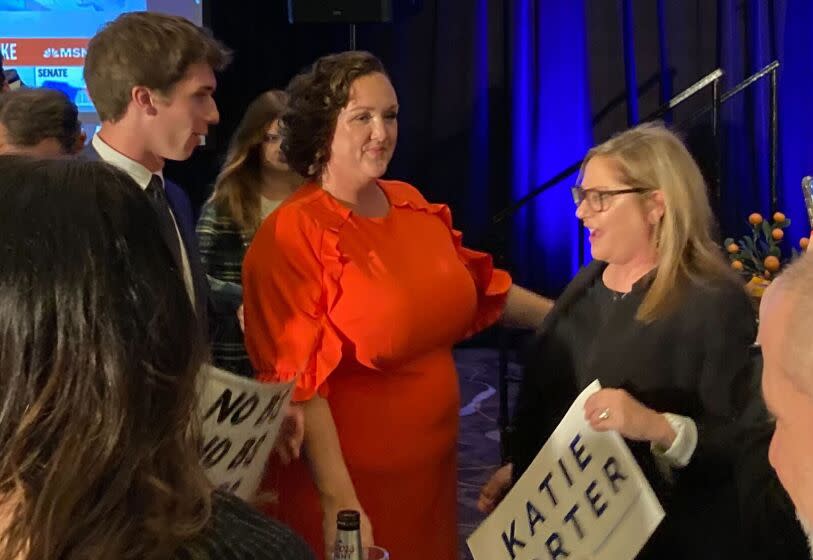'It's all over the place.' Tight California congressional races are still too close to call

- Oops!Something went wrong.Please try again later.
- Oops!Something went wrong.Please try again later.
Ten competitive congressional races in California that could end up determining the balance of power in the House were still too close to call Thursday.
Congressional campaigns on both sides of the aisle expressed cautious optimism as election officials continue tallying votes, a process that could take weeks.
With the prospect of the House majority on the line, the entire nation may be kept in suspense because of California’s notoriously plodding count — a scenario few expected in the lead-up to election day.
“I guess I’m surprised that it’s kind of coming down to California,” said Paul Mitchell, vice president of the political data analysis firm PDI. “I expected the Republicans to pick up 10 to 12 seats in the House, and that’s before they even got to California.”
In the 41st Congressional District, Democrat Will Rollins was trailing Rep. Ken Calvert — the longest-serving GOP member of California’s congressional delegation — by more than 1,250 votes as of Thursday evening.
Calvert’s past opposition to gay rights may have hurt him among the Coachella Valley’s large LGBTQ community, said Mitchell, which could be one reason the early results had trended toward Rollins, who is gay.
Rollins told The Times on Wednesday, when he still was leading in the vote count, "We feel like we're going to win this one." Thursday he tweeted that he remained "optimistic."
Calvert's campaign did not respond to a request for comment.
On Tuesday, chatter of an impending national "red wave" could be heard across the Orange County nightclub where GOP congressional hopeful Scott Baugh and others gathered to await election results.
The mood in the packed club dampened when the results began rolling in, but Baugh, who is challenging Democratic Rep. Katie Porter to represent the 47th Congressional District in Orange County, remained confident.
"Early returns in California as you know always favor the Democrats. How many of you voted on election day?" he asked the crowd as hands shot up. "You're going to reverse what the results are right now and you're going to put us in the lead by midnight."
At midnight, Baugh was trailing Porter by fewer than 1,000 votes. By Thursday, Porter's lead had grown to just under 3,000.
The mood in Porter's camp was one of cautious optimism Wednesday. In 2018, it took 11 days for the race between Porter and Republican Mimi Walters to be called.
“There are still tens of thousands of ballots left to be counted, and our campaign respects Orange County voters and will wait patiently for the results," said campaign spokesperson Lindsay Reilly.
The popularity of mail-in ballots means that results can frequently take longer in many states, including California, than voters typically expect, said Paul Gronke, a professor of political science and director of the Elections and Voting Information Center at Reed College in Portland, Ore.
“It’s going to make it particularly difficult this year with results coming in at different rates, and it’s going to open up a window for people to charge malfeasance," he said.
Still, he added, just because the vote is taking longer to count doesn’t mean there’s something wrong.
In the Central Valley's 22nd district, Republican Rep. David Valadao was ahead of Democratic Assemblyman Rudy Salas by about 3,600 votes on Thursday.
In 2018, publications across the state initially declared Valadao the winner in his bid for reelection against his Democratic challenger. However, the results reversed as ballot counting continued through the rest of November, and Valadao conceded the race in early December.
Valadao acknowledged his campaign "always knew this race was going to be tight," but he was hopeful about early returns.
Salas said he was waiting patiently for votes to be counted.
After Republican Rep. Young Kim was found to have won reelection Thursday evening in a mostly Orange County district, 10 of the races seen as having the highest chances of flipping remained undecided, as did six other congressional contests.
The variables and caveats in the Golden State's midterm races are many, which makes predictions difficult. The upending of traditional voting methods during the pandemic, uncertainty about the state of democracy and even wet weather on election day could be factors.
Heavy rain over the weekend and on election day might have spurred some voters to mail in ballots at the last minute rather than brave the elements to vote in person, Mitchell said.
Recently, more Republicans have been voting in person on election day because conspiracy theories spread by former President Trump and others have made them distrustful of mail ballots. And since the pandemic, more Democrats have turned to vote by mail. Historically, it was the other way around.
The uncertainty and norm-busting is enough to make Mitchell throw up his hands.
“It’s all over the place,” he said. “We don’t know who voted, and at what magnitude."
Times researcher Jennifer Arcand and Times staff writer Seema Mehta contributed to this report.
This story originally appeared in Los Angeles Times.

